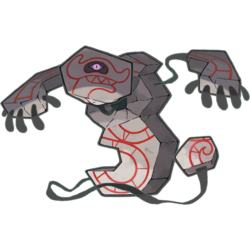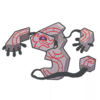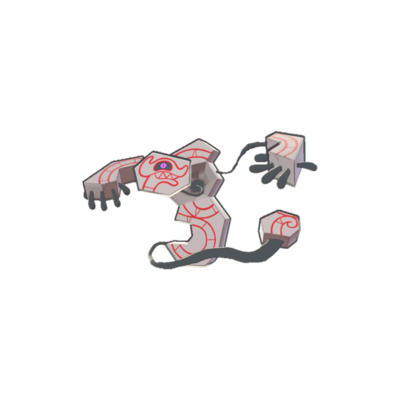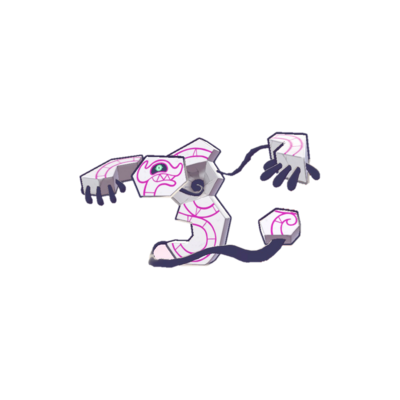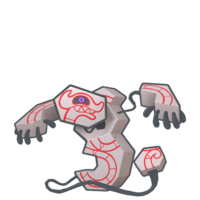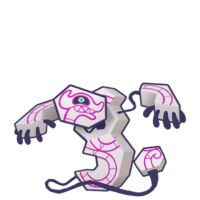From Bulbapedia, the community-driven Pokémon encyclopedia.
|
|
| Line 265: |
Line 265: |
| |defense=237 | | |defense=237 |
| |fast={{m|Astonish}}, {{m|Shadow Claw}}{{tt|*|From September 1, 2022 onward}} | | |fast={{m|Astonish}}, {{m|Shadow Claw}}{{tt|*|From September 1, 2022 onward}} |
| |special={{m|Rock Tomb}}, {{m|Sand Tomb}}, {{m|Shadow Ball}} | | |special={{m|Rock Tomb}}, {{m|Sand Tomb}}, {{m|Shadow Ball}}, {{m|Brutal Swing}}{{tt|*|From September 3, 2024 onward}} |
| }} | | }} |
| |} | | |} |
Revision as of 14:32, 18 August 2024
Runerigus (Japanese: デスバーン Deathbarn) is a dual-type Ground/Ghost Pokémon introduced in Generation VIII.
It evolves from Galarian Yamask when the player travels under the large rock arch in Dusty Bowl after Yamask takes at least 49 HP in damage from attacks without fainting.
(Refer to Game data→Evolution data for more details.)
Biology

Serpent pattern on Runerigus
Runerigus is a Pokémon composed of an oblong, irregularly-shaped clay slab, with an outline of a stylized serpent with sharp teeth painted onto it in red. Two sections of the slab at the upper left and upper right side, along with a piece bearing the serpent's head and a small piece bearing the tip of the image's tail, have broken off and are held in place by shadowy black tendrils that form its arms, neck, and tail respectively; the "tail" fragment also resembles the piece carried by Galarian Yamask. It has five black fingers on each hand, which extend from the ends of the fragments forming its arms. It has a single purple eye located in the same spot as the painting's eye. Runerigus seems to be distantly related to Cofagrigus.
Runerigus was formed from a painting imbued with an ancient curse, which was activated by absorbing the spirit of a Yamask and brought the painting to life. Anyone that touches its shadowy body will have the memories behind its painting's creation forced onto them.
Runerigus and its pre-evolution, Galarian Yamask, are the only known Pokémon that can have Wandering Spirit as an Ability.
Evolution
Runerigus evolves from Galarian Yamask.
(For specifics on this Pokémon's Evolution in the games, refer to Game data→Evolution data.)
Game data
Pokédex entries
| This Pokémon was unavailable prior to Generation VIII.
|
| Generation VIII
|
|
Galar
#328
|
|
Sinnoh
#—
|
|
Hisui
#—
|
| This Pokémon has no Pokédex entries in Brilliant Diamond, Shining Pearl, and Legends: Arceus.
|
| Sword
|
A powerful curse was woven into an ancient painting. After absorbing the spirit of a Yamask, the painting began to move.
|
| Shield
|
Never touch its shadowlike body, or you'll be shown the horrific memories behind the picture carved into it.
|
|
|
|
|
Game locations
| This Pokémon was unavailable prior to Generation VIII.
|
|
|
|
|
In side games
| This Pokémon was unavailable prior to Generation VIII.
|
| Generation VIII
|
|
| This Pokémon is unavailable in Generation VIII side games.
|
|
|
|
|
Stats
Base stats
| Stat
|
Range
|
| At Lv. 50
|
At Lv. 100
|
58
|
|
118 - 165
|
226 - 320
|
95
|
|
90 - 161
|
175 - 317
|
145
|
|
135 - 216
|
265 - 427
|
50
|
|
49 - 112
|
94 - 218
|
105
|
|
99 - 172
|
193 - 339
|
30
|
|
31 - 90
|
58 - 174
|
Total: 483
|
Other Pokémon with this total
|
- Minimum stats are calculated with 0 EVs, IVs of 0, and (if applicable) a hindering nature.
- Maximum stats are calculated with 252 EVs, IVs of 31, and (if applicable) a helpful nature.
|
Type effectiveness
| Under normal battle conditions in Generation IX, this Pokémon is:
|
|
|
|
|
|
|
|
|
|
|
|
|
Learnset
|
|
|
|
- Bold indicates a move that gets STAB when used by Runerigus
- Italic indicates a move that gets STAB only when used by an Evolution of Runerigus
|
|
|
|
|
- Bold indicates a move that gets STAB when used by Runerigus
- Italic indicates a move that gets STAB only when used by an Evolution of Runerigus
|
|
|
|
|
- Moves marked with an asterisk (*) must be chain bred onto Runerigus in Generation VIII
- Moves marked with a double dagger (‡) can only be bred from a Pokémon who learned the move in an earlier generation.
- Moves marked with a superscript game abbreviation can only be bred onto Runerigus in that game.
- Bold indicates a move that gets STAB when used by Runerigus
- Italic indicates a move that gets STAB only when used by an Evolution of Runerigus
|
|
|
|
|
- Bold indicates a move that gets STAB when used by Runerigus
- Italic indicates a move that gets STAB only when used by an Evolution of Runerigus
|
|
|
|
|
- Bold indicates a move that gets STAB when used by Runerigus
- Italic indicates a move that gets STAB only when used by an Evolution of Runerigus
|
Side game data
Evolution data
Galarian Yamask evolves into Runerigus when the player travels under the large rock arch in Dusty Bowl after Yamask takes at least 49 HP in damage without fainting. Healing does not reset the counter, and damage can be taken across multiple battles. Taking damage from certain sources, such as self-inflicted Curse damage or weather effects, does not contribute to the 49 HP damage requirement.
|
|
 + + 
Pass under the rock arch
in Dusty Bowl after taking at least 49 HP
in damage from attacks without fainting
→
|
|
Sprites
| This Pokémon was unavailable prior to Generation VIII.
|
|
|
| This Pokémon is unavailable in Generation IX.
|
|
|
In the anime
Major appearances
Runerigus debuted in Chasing to the Finish!, under the ownership of Sterling. It was used to battle Goh and Gary, alongside Lyla's Sandaconda, before being defeated by Blastoise and Cinderace.
Minor appearances
A Runerigus appeared as one of the residents of the Ancient castle in Reunion at the Ancient Castle!. In the following episode, it helped Diana evacuate the other Pokémon from the castle in the wake of the Explorers' attack.
In the manga
In the TCG
- Main article: Runerigus (TCG)
Trivia
- Runerigus's Attack and Special Attack stats are the reverse of Cofagrigus's, while their other stats are identical.
- Galarian Yamask's evolution into Runerigus is the only location-based evolution in Pokémon Sword and Shield, as all other Pokémon with location-based evolutions are either unobtainable or use an Evolution stone to evolve instead.
Origin
Runerigus may be based on runestones, large stones engraved by Vikings used to commemorate the lives of notable people and events, such as the England runestones erected in remembrance of Vikings who travelled to England and died there. Many of the discovered runestones had motifs in the shape of serpents or dragons; Runerigus's motif may specifically be based on Jörmungandr, the World Serpent of Norse mythology who was sometimes depicted on runestones, or Apep, the serpentine primordial embodiment of chaos in Egyptian mythology. Runestones were also believed to have mystical properties that conveyed powers of protection, wealth, and victory, and some runestones had curses inscribed on them, warning that anyone who damages or moves them would be doomed to death or being an outcast.
The method to evolve a Galarian Yamask may be inspired by funeral rites in different culture. The fact that Galarian Yamask evolves into Runerigus after taking at least 49 HP in damage could be a very subtle reference to the antarābhava, a Buddhist concept of Purgatory after death and before reincarnation; this process of Buddhist Purgatory is said to last 49 days. The location of evolution, namely the stone arch in Dusty Bowl, resembles a dolmen, while the arrangement of surrounding monoliths resemble that of a stone ship.
Name origin
Runerigus may be a combination of rune and egregious or Cofagrigus.
Deathbarn may be a combination of death, 板 ban (slab), and Desukarn.
In other languages
| Language
|
Title
|
Meaning
|
 Japanese Japanese
|
デスバーン Deathbarn
|
From death and 板 ban
|
 French French
|
Tutétékri
|
From Tutankhamun and a pun of tout est écrit
|
 Spanish Spanish
|
Runerigus
|
Same as English name
|
 German German
|
Oghnatoll
|
From Ogham, Echnatoll, and a pun of Och, na toll!
|
 Italian Italian
|
Runerigus
|
Same as English name
|
 Korean Korean
|
데스판 Despan
|
From death and 판 (板) pan
|
 Mandarin Chinese Mandarin Chinese
|
死神板 Sǐshénbǎn*
迭失板 Diéshībǎn*
|
From 死神 sǐshén and 板 bǎn
From the transcription of Japanese name, 失 shī and 板 bǎn
|
 Cantonese Chinese Cantonese Chinese
|
死神板 Séisàhnbáan
|
From 死神 séisàhn and 板 báan
|
|
|
|
| More languages
|
 Hindi Hindi
|
डैमौशिल Demaushil
|
From death, मौत maut, and शिल śil
|
 Thai Thai
|
เดธบาน Detban
|
Transcription of trademarked Japanese name
|
|
|
|
Related articles
External links

|
This Pokémon article is part of Project Pokédex, a Bulbapedia project that aims to write comprehensive articles on each Pokémon species, as well as Pokémon groups and forms.
|
 For other sprites and images, please see Runerigus images on the Bulbagarden Archives.
For other sprites and images, please see Runerigus images on the Bulbagarden Archives.

